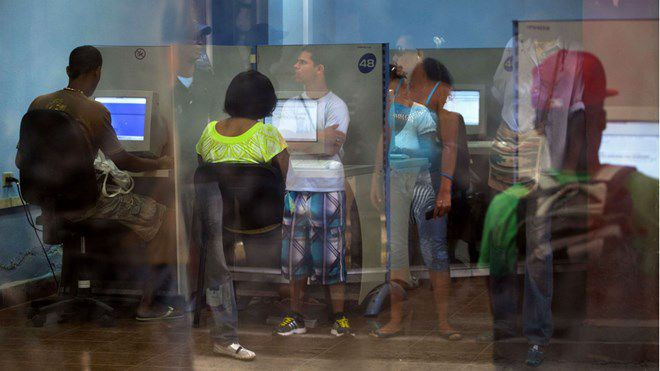Cuba cooperates with the US to boost Internet connectivity
On February 20, Etecsa Telecommunications Company (Cuba) announced that it had decided to negotiate with IDT Telecommunications Group (USA) to sign an International Telecommunications Operations service contract, allowing direct connection between the two countries.
 |
| Havana residents line up to use the Internet at a post office on May 28, 2013. |
There are no further details about the negotiations between Etecsa and IDT or the content of the agreement to be signed, only a notice posted on Etecsa's website.
Hinting that the US government is also waiting for this agreement, the Cuban company said: “The restoration of direct connections between the US and Cuba will facilitate further improvement of infrastructure and the quality of communication between the people of the two countries.”
On February 19, Etecsa employees recognized the need to add pricing policies to make connection services more accessible.
They also announced plans to open 136 more Internet cafes across the country in the first quarter of 2015 and cut Internet service prices in half until April 10 as part of a promotional campaign.
The telecommunications cooperation between the United States and Cuba is very much in line with the re-establishment of diplomatic relations between the two countries.
In January, Washington approved a plan to provide the island with a range of telecommunications services as part of its new policy toward Havana. The United States not only wants to influence Cuba through communications and media, but also shows its intention to do business with the country.
The direct connection plan also fits well with the current trend of computerization in Cuba.
On February 20, the first National Conference in Cuba on Computerization and Cybersecurity placed great importance on computerization in the country to promote economic and social development, as the United States is loosening restrictions on trade in computer technology and software.
The conference, which took place from February 18 to 20, attracted more than 11,000 experts in hopes of finding new national standards as the simplification of import regulations is increasing Cuba's average Internet traffic.
At a meeting, about 260 experts discussed four main issues: available human resources and science in the country; e-government; information security; and economics and legality.
Cuba's Deputy Minister of Communications Wilfredo Gonzalez Vidal admitted during the discussion that 70% of the country's Internet infrastructure is outdated. He said that Cuba's current situation "does not allow us to meet many of the needs of our people."
Mr. Gonzalez said it was necessary to provide people with new devices and implement policies that encourage Internet use.
Deputy Minister Gonzalez stressed that this would have a major impact on society and said that Cuba already had a legal framework to allow greater access from the people.
Cuba's current priorities are to promote e-government, boost the national software industry and propose developing IT solutions together with private businesses.
Apple said on February 18 that it has some products and software that will soon be available for sale in Cuba.
Havana has had an Internet connection since 1996 via satellite, as the embargo prevented the island nation from being connected by underwater cables.
In 2011, Venezuela helped them connect with a fiber-optic cable from Venezuela, but access remains limited. Cuban authorities say that providing Internet access to all households will require infrastructure and a large investment.
In June 2013, as part of his reform plan, Cuban leader Raul Castro introduced public Internet service for the first time with 118 Internet cafes across the country.
However, the price of 4.5 USD/hour is still too high compared to the average income of people which is 20 USD/month.
According to the International Telecommunication Union, as of 2013, only 3.4% of households here had Internet access.
According to Infonet
| RELATED NEWS |
|---|






